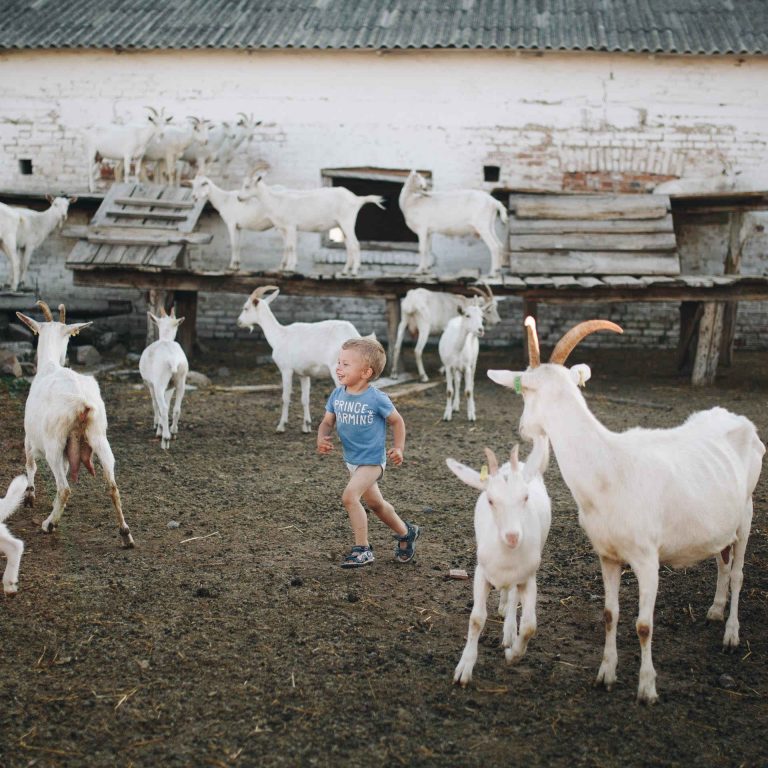In Naddniprianshchyna, central Ukraine, dozens of farmers decided to revive goat breeding around the same time. The family farms ‘Zolota koza’ (‘Golden Goat’) ‘Babyni kozy’ (‘Grandma’s Goats’) ‘Lisova ferma’ (‘Forest Farm’), and ‘Pani Koza’ (‘Mrs Goat’) are all engaged in this type of farming, which began to actively develop in Ukraine in the early 2000s.
The farmers raise goats, produce different types of goat milk, and develop green tourism. Most of them lived in cities for a long time, but left everything behind to find themselves in rural areas, surrounded by nature and natural products. Today, the benefits of goat milk, so the demand for products derived from it is growing.

‘Zolota koza’ (‘Golden Goat’)
Married couple Tetiana and Serhiy Orlovskyi have not been apart since they first met; soon they will celebrate their 20th wedding anniversary. They have four grown-up children and a goat farm in Naddniprianshchyna, in the village of Pokrovka. Tetiana is the head of the children’s theatre group in Kyiv, and devotes the rest of her time to the ‘Golden Goat’ farm. The family was one of the first to build their business on goat breeding. They recall how in 2009, they completely changed the vector of their operations.
Before the goat farm was built, the couple worked in advertising and communication. The Orlovskyis organised various training events, where they talked in particular about the right of every Ukrainian citizen to two hectares of land for agricultural activities. Eventually they decided to prove by their own example that this was possible. They received a plot of land in the small village where Serhiy’s family comes from — according to the Orlovskyis, an impenetrable “solid jungle”.

A farm reborn from the ashes
After acquiring their land, the couple started looking for ideas for how to use it. With 15 years of work experience under their belts at their own advertising agency, the Orlovskyis spent time looking at different options. Then Tetiana and Serhiy got the idea of creating a goat farm.
However, acquiring the breed they wanted (Saanen goats, considered to be one of the best breeds in the world) was unrealistic: this was 2009, when goat farms in Ukraine were only just starting to be built and developed. Some time later, they received an offer from neighbouring Belarus. So it was that Tetiana and Serhiy went to buy their first hundred goats. They had some difficulties transporting the goats, owing to a mistake made by the broker and a missing stamp in the documentation. As Tetiana jokingly remembers, this is how the name of their farm came to be:
“When we crossed the border four times all because of some stamp, we calculated the costs, and I said, “Serhiy! We have golden goats!” So we decided to call ourselves ‘Zolota Koza’.”

In the 2000s, there was still a lack of literature on commercial goat breeding. In the beginning, the Orlovskyis did everything through trial and error, then went to study abroad in Lithuania. Constant practice and searching for information on the internet yielded positive results.

However, their successful startup was ravaged by a fire. Showing us around the territory, Serhiy shows the foundation on which the farm stood several years ago. In 2014, it was destroyed by fire in the space of just four hours. After the tragedy, neither the couple nor their family and friends could believe that all would be restored. However, acquaintances of theirs — and the goat farm’s first customers — unexpectedly came to the rescue. Subsequently, Tetiana and Serhiy rebuilt everything. Today the foundations and the corrugated steel roof remind them of the old times:
“There’s a photo of Tanya standing in the ashes. To be honest, I can’t look at this photo without crying. But God does not give us greater trials than we can endure. And if God is on our side, then who is against us? There will be more; after all, we have dreams and wishes.”

One of those dreams to have is a large artisanal cheese factory where they could process a lot of milk. The pair are striving to develop green tourism on the farm, to enable those who wish to come to taste the cheese, spend time with the animals, and relax.
Currently, the village where the farm is located has a population of about 80. The huts in the village are all built with clay. Although there are some who work on the ‘Zolota Koza’ farm, the farmers note that Pokrovka has been in decline for generations, as young people head to the big cities and stay there for life. Previously, Tetiana and Serhiy helped the local school and cultural centre; now, however, it no longer makes sense because there are not enough people. Serhiy admits that in Ukraine, recruitment is almost the biggest problem: not even of skilled workers, but rather of unskilled labour. For Serhiy, one of the main reasons for the low productivity is the negative impact of the Soviet Union and, of course, the human factor.

“In the Soviet generations, a lot was “killed” in the way of skill, and the desire to work for oneself and others. Because of this, people can still somehow work for themselves, but very often, when they work for others, all they think about is how to deceive and steal. In the Soviet Union, the idea was: “Everything around belongs to the kolhosp (collective farm — tr.) so everything around is mine.”
The couple also recall their first reports about their activities: they mentioned shearing rather than dairy production. Although no one really sheared the animals, this was all that was included in the report; there was a dash in the column marked “goat milk”. This was because in the Soviet Union, goats were not perceived as animals. They say that things are different now, but there is no shortage of administrative and bureaucratic problems.

Unique animals
Based on their own experience, the farmers are convinced that you do not need to study and practice for years to be successful in agribusiness. Half a year was enough for them. Tetiana says it took her six months studying quickly and intensively thanks to information on the internet and her remarkable determination to understand goat rearing.
The first birth on the farm was a test for her; it also turned out to be a very difficult one. Tetiana herself helped to deliver the kids, while the semi-conscious village milkmaids stood nearby. Despite her lack of experience, she kept her cool and managed to save the goat. Tetiana explains that her determination comes from her love for her work.

“The most important thing is to love what you do, to be fired up about it, to get a thrill out of it, so that it gives you joy, and so you understand that someone else needs it besides you.”
They also remember the first shows where they offered their goat milk for tasting. People generally had negative expectations, but they completely changed their minds after experiencing the distinct taste and quality of the milk.
Tetiana and Serhiy are convinced that goats are the best animals to cooperate with: they are hard workers who deserve respect, nurture and affection. Tetiana says that if you take care of them with love, they show gratitude and become attached to you.

“Very grateful, very grateful animals. If you treat them well, then everything is better, they’ll follow you everywhere: you’ll go out to the pasture and they’ll come toward you and say ‘scratch me, I love you, and you love me.’”
The Orlovskyis discuss the production of goat milk, which is said to be unique for its composition and its nutritional and healing qualities. Daily milk yields depend on the season. The largest milk yields occur in May and June; January-February is the birthing season, when the milk is mainly used for feeding kids.
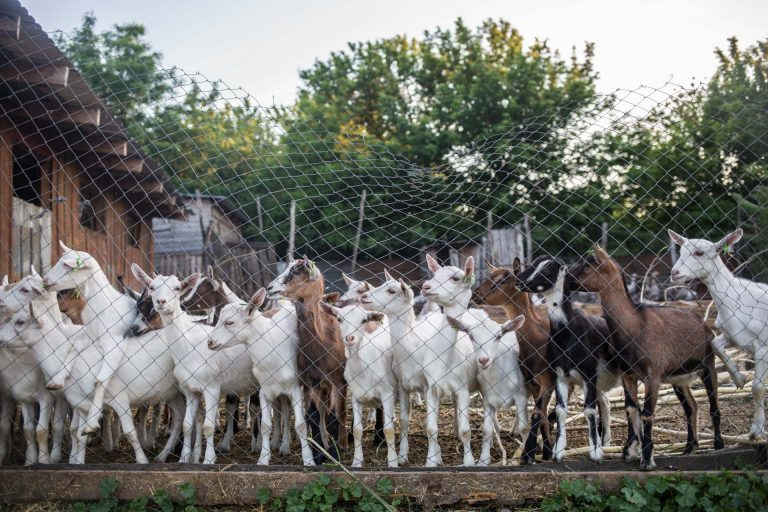
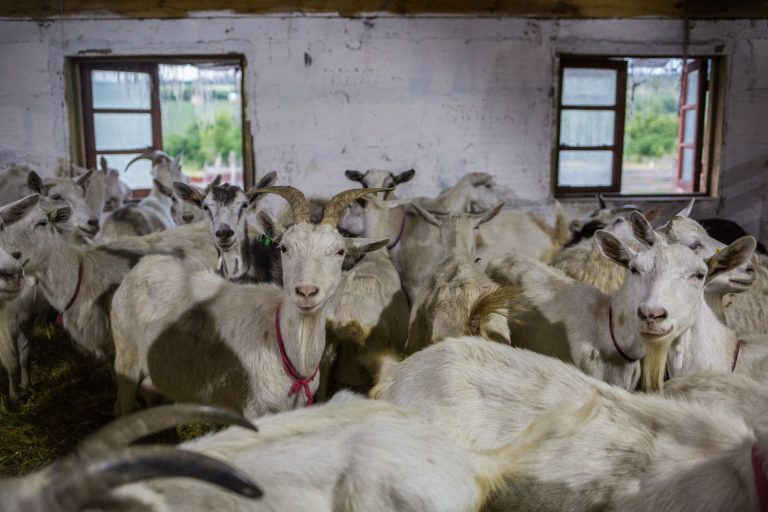
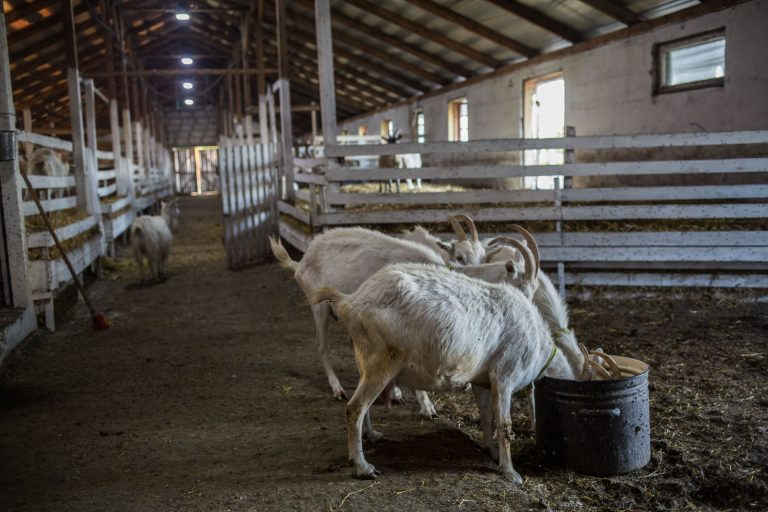
slideshow
The star of ‘Golden Goat’ is a goat named Princess. She produced six litres of milk for her first litter and 9,200 litres of milk for her second. Now they are waiting for her new litter and new records. She is presumed to have inherited this from her mother, who was also a record-breaker in her time.
Once they had got their milk production going, the couple mastered cheese-making over time. So it was that the Orlovskyis’ small craft cheese factory appeared on the ‘Golden Goat’ farm. Around twenty types of various cheeses are made there, from hard to soft and creamy. Serhiy is glad that people like their products.

“We started making cheeses, and when we were told that our cheeses were no worse than the French ones, it was very nice. And then people come and say, ‘You know, your cheeses are better than the French ones!’ Goat cheeses don’t just have taste and aroma, they have many other qualities too. The general effect of goat cheese on the body can even be equated to the action of antibiotics; they remove pathogenic elements. It’s very important. We can have all this thanks to the goats. They are unique animals.”

‘Mrs Goat’
Viktoriia Boiprav and Ihor Harashchenko are another family engaged in goat rearing and cheese making. In the year 2014, after the Russian occupation of Crimea, the family had to move from Yalta with a one-and-a-half-year-old child in their arms. They had to cross the border in a hurry; they effectively fled. Igor remembers the way they left Crimea:
“We had an orthopaedic mattress store, and we worked in façade systems. We left Crimea in a hurry, considering my political activity in the UDAR party (Ukrainian Democratic Alliance for Reform, a political party headed by Vitalii Klitschko — ed.). Besides, I participated in Maidan, from the first to the last day. We gathered what we could, and shipped it. Our things went separately, no one knew they were ours, and we managed to leave quickly in the car with the little one.”

After leaving the peninsula, the family moved to the village of Pervomaiske in Naddniprianshchyna, to Ihor’s parents’ house, which was built by his grandfather. Soon came some radical changes: a baby daughter was born, and the family bought a 7.5-hectare plot of land where they established their farm, ‘Mrs Goat’. At first they worked in meat production, but then realised it was economically unprofitable. After much thought, and inspired by the example of Bernard Willem — a Belgian who set up a goat farm in Lviv region — the Usyks set out to master cheese making and goat breeding.
Now Ihor is building a farm, and Viktoriia makes the cheese. She talks passionately about the cheese that they have learned to make. It took them eight months to do it, and according to Viktoriia and Ihor, it was worth it.
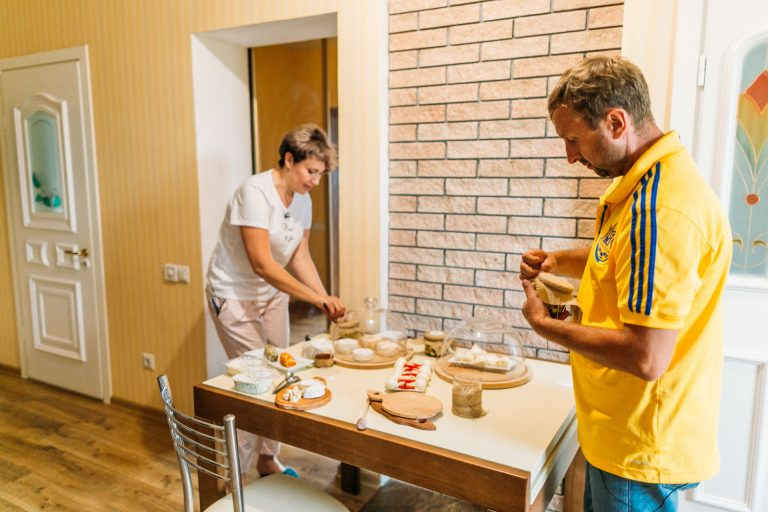
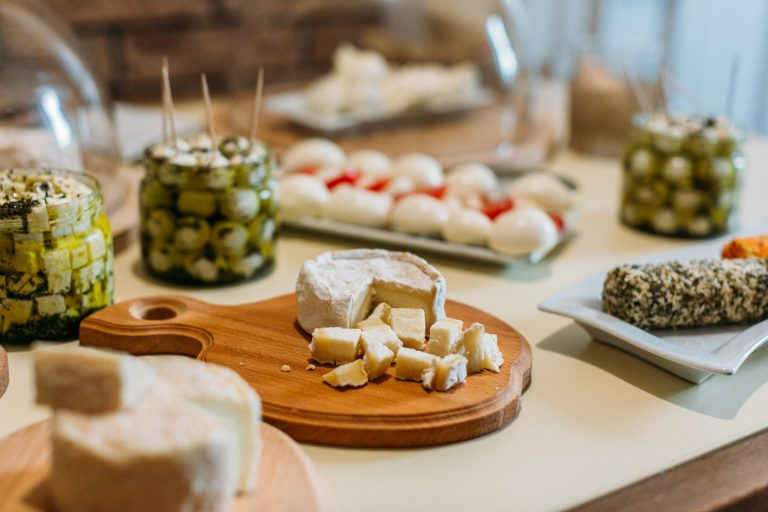
slideshow
We do what we love
The farmers work with unpasteurised milk; however, they ensure that they submit their product for analysis and that the goats all receive vaccinations and veterinary care. Therefore, all the products produced on this farm undergo safety checks and quality control.
Viktoriia is so passionate about her work, that she can talk about cheeses and the particularities of their production for hours. She conducts a tour of her cheese kingdom, describing each cheese and its ingredients. To French-style goat cheese, she adds rosemary, cumin, sage, oregano, and marjoram. ‘Mrs. Goat’ also makes cheese from cow’s milk purchased in a neighbouring village: notably, ricotta and labneh that is seasoned with cumin and sage. Viktoriia also makes cheese from cow’s milk with the rich taste of Provençal herbs, which is soaked for about two months in whey brine.

Viktoriia’s favourite cheese is the signature chevrette (French for ‘young goat’ — ed.), similar to Camembert, but with a special taste derived from the use of unpasteurised goat milk. She says that nothing like chevrette can be found in the shops and that this cheese can be used at all three stages of maturation: young, mature, or aged.
Viktoriia also shows off her mozzarella, burrata and halloumi (a Cypriot cheese that does not spread during frying), as well as a new addition — cheese with cranberries.

Another special type of cheese developed at “Mrs. Goat’ is the crottin (a small, round cheese made from goat milk, originally made in France — ed.). It was with this cheese that Viktoriia Boiprav began her cheesemaking course. For a long time she experimented with the shape and weight: after all, this is a cheese for true foodies. Sher continues her culinary tour, introducing other types of artisan cheeses:
“That’s what we called ‘seasonal chèvre’. On this cheese, matured for three months, Roquefort mould starts to develop, giving it a piquant sharpness. And this is ‘Cinderella’, a crottin rolled in fruit tree ash. We make the ashes ourselves: we pound it in a granite mortar, then sift it. It’s a very labour-intensive cheese, but it’s worth all the effort. We make the cheese in small portions, so a person can take a head of cheese for their entire family, and enjoy it with coffee or wine.”

Goat Therapy
There is still a goat grazing among Ihor and Viktoriia’s livestock; for this reason, they named the family farm and creamery ‘Mrs. Goat’. The goat’s name is Antelope, and the farmers call her the ‘fairytale goat’. Viktoriia remembers how they came up with this noble name:
“I walked up to the goats and watched them (it’s a kind of goat therapy); and I see there is a particularly dignified one (our Antelope is a kind of “tsarina”). For some reason, it was then that the phrase ‘Mrs. Goat’ came to me. These animals are very graceful, beautiful, and of course, their milk is special: it grows mould on its own, without us having to introduce additional freeze-dried cultures, which is why it is expensive.”
Viktoriia is convinced that the goats are far more than just animals used for dairy farming. They understand everything and can sense the moods of humans.
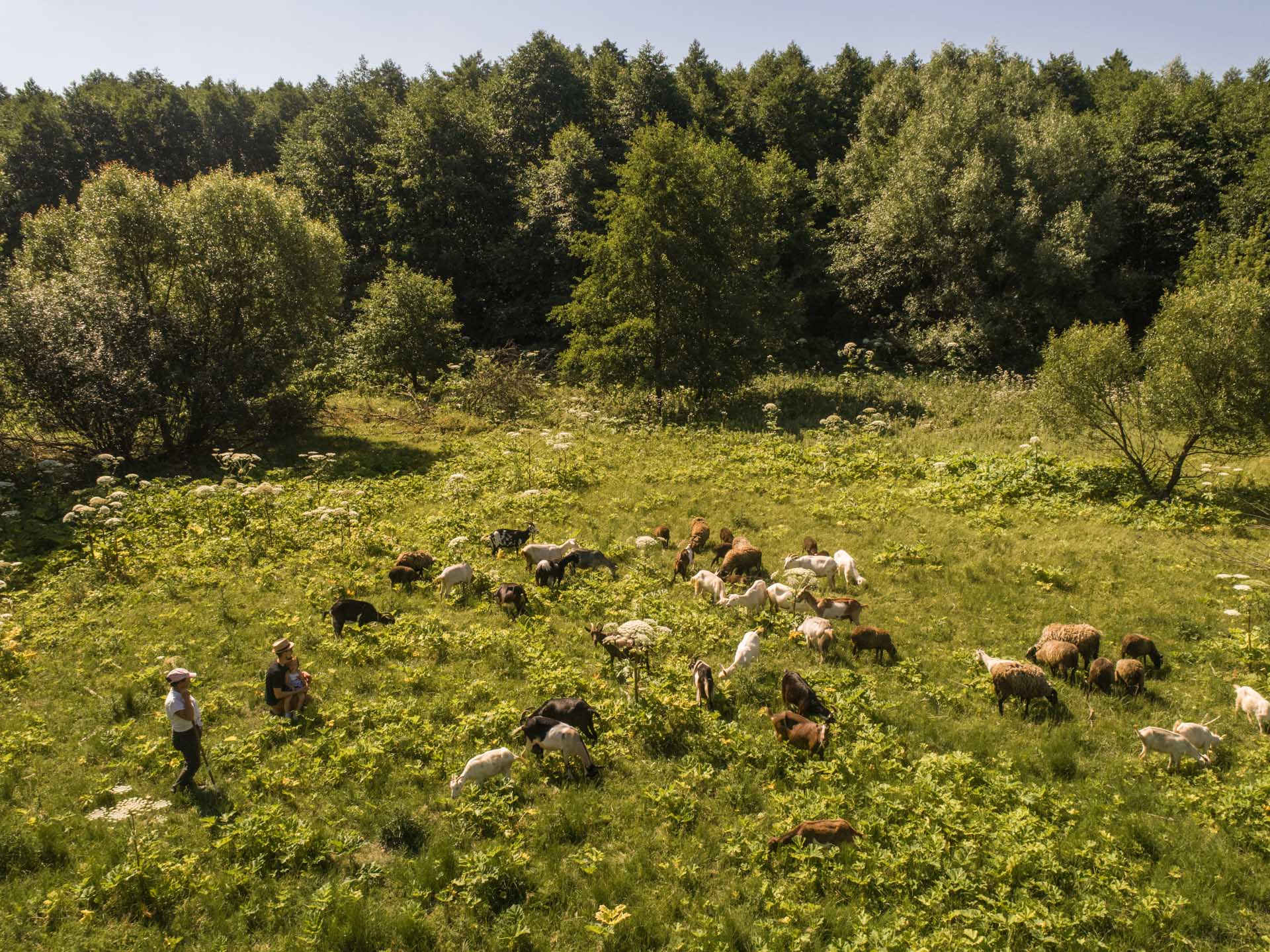
Lisova (‘Forest’) Farm
Viktor Chirkin moved from Kharkiv to the small village where his family is from: Stavyshche, in Naddniprianshchyna. After all, the air at home is cleaner, and the produce is healthier. He says that he got the idea for ‘Lisova’ (‘Forest’) Farm’ in 2015, the year when he and his family moved to their homelands). Since then, they started actively working to make the idea a reality. Viktor tells their story:
“My parents moved here in 2010. They lived in the city and worked with foreign missionaries — in religious education — and I went on to study similar subjects. I studied in the States (in South Carolina, at Bob Jones University), and received a bachelor’s degree there. When I returned, I worked in business for four years: first as a salesman, then as a manager, and as executive director of a company. But in 2014, I started having problems with my health and wellbeing. But whenever I came here, my problems disappeared as if by magic. So we decided to move. We didn’t immediately know what we were going to do; then we started doing what we’re doing now.”
It was Viktor’s father who had the idea of making cheese: Viktor calls him the initiator of the entire business. He points out that the cheese is a strategic, high-quality product, which can equally be sold within two weeks, or after six months in storage. Plus, competition on the market is low. Viktor says the family initially bought a small number of goats; an important factor was the delicious milk.

A Family Business, European-style
Later on, when things settled down a little, the Chirkins began to breed their own livestock. Viktor says that all this was a colossal experience and a remarkable responsibility. What’s more, goat farming is not just a trial business, but also an opportunity to provide themselves with food. After all, we are what we eat.
The only thing they buy for dairy production is yogurt starter cultures, which are very difficult to produce in natural conditions. Nowadays, Lisova Farm is home to about 50 goats and sheep: 15 mature, the rest still young.

Viktor calls his business a form of art. Today, it is his opportunity to make something of himself. Yet, in spite of this, he is not aiming to build something too large-scale. For him, it is important to have a small, well-organised business that involves the whole family. Just the way it is now. Viktor’s mother also takes care of the goats — she milks and feeds them, sometimes with the help of her younger son, Viktor’s brother. Viktor himself makes and sells the cheese.
The Chirkins firmly believe that the most important thing for a family is to be together. Once established in childhood, this value stays forever. Perhaps this is why they easily find common ground in matters of family business too.
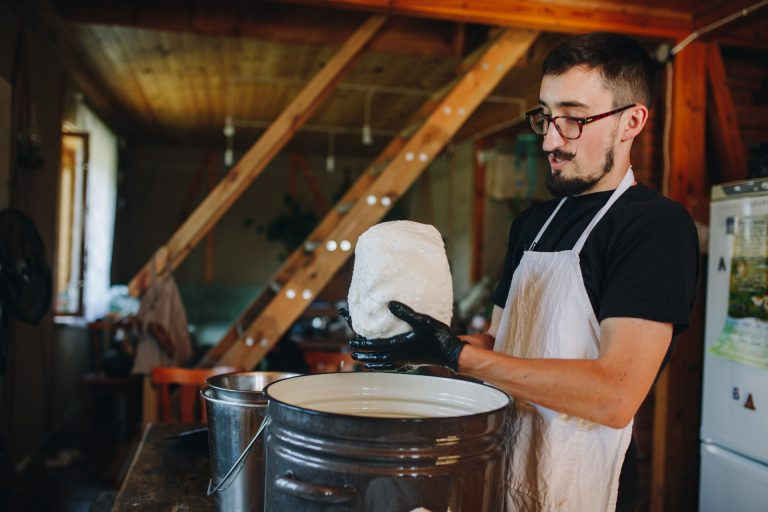
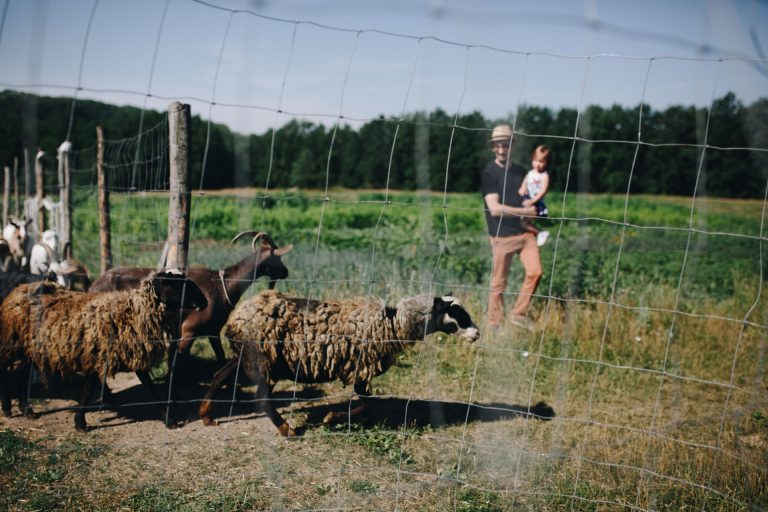
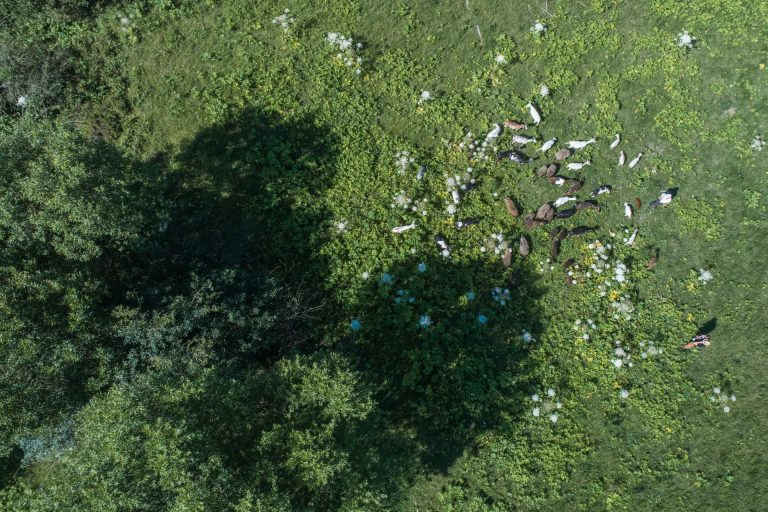
slideshow
Viktor’s mother is a piano teacher. Previously, she worked at a music school and a military unit, as her husband was involved in the army. She also tried being a typist and a cook. The family travelled a lot around Ukraine, then finally returned to their home to start a new business.
The idea of a small but progressive family farm — based on the European model — is one that Viktor is implementing at different levels: not only organisationally, but also creatively. For example, he is now mastering the art of video, in order to promote their products more effectively via social media.

“I enjoy the present moment. I like to do what I do. I am learning so many skills right now. I know two crafts: how to make cheese or how to bake bread, which people eat everywhere. I did all the marketing entirely through Instagram and Facebook. That’s also a skill that can be used in any business. Recently, we also had to shoot and edit videos — this is something new, it also gets me out of my comfort zone, and makes me grow a little more.”

‘Babin’s Goats’
For Oleksandr Babin, commercial goat farming started unexpectedly, with two goats, when he moved from Sumy region to Tetiiv district in Kyiv region. At first, he did not envisage that he would be making cheese: he bought the goats in order to sell the milk. However, as it turned out in practice, there is no need to produce large quantities of goat milk in one place. To sell it, you need to have an extensive network of customers and deliver a few litres to a large number of shops. This requires not only a lot of time, but also considerable expenditure.
Selling cheese is much easier, as it can be stored for a long time and transported at higher temperatures than milk. Given all this, Oleksandr and his wife Anna had to learn how to make cheese. Since then, he has been making hard cheeses while Anna is responsible for soft cheeses. Anna Babina is a technologist in the processing of livestock products, so she has not only practical skills but also theoretical knowledge.

They met on the farm — Anna came for her undergraduate internship, and stayed with Oleksandr to build a family business. Following her arrival, various projects were born, including the creamery and green tourism. Little Zakhar also helps his parents on the farm. Though only two and a half years old, he is already taking on responsibilities, conducting tours for young visitors to the farm.

Purebred Herd
The farm is named after the owner. Oleksandr’s surname is Babin, and so the goats are ‘Babin’s’. Thus appeared the name ’Babin’s Goats’ (the name ‘Babyni Kozy’ is a play on words in Ukrainian, also meaning ‘Granny’s Goats’ — tr.). Currently, there are 180 milk-producing goats on the farm, and about twenty growing kids. Oleksandr remembers how it all began:
“I bought my first goats in the city of Konotop, Sumy region, and then moved them here with their offspring. I kept buying more and more goats. As of 2010, I already had about eighty, all sorts of crossbred goats. And then, in 2010, I got 150 Saanen goats from the Baltics, and since then we have been looking after them, maintaining the purity of the breed, and breeding Saanen goats. Now we have a purebred herd.”
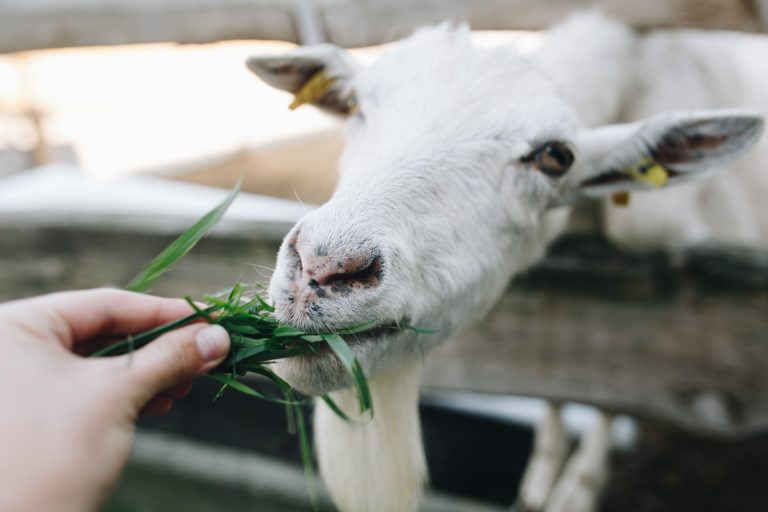
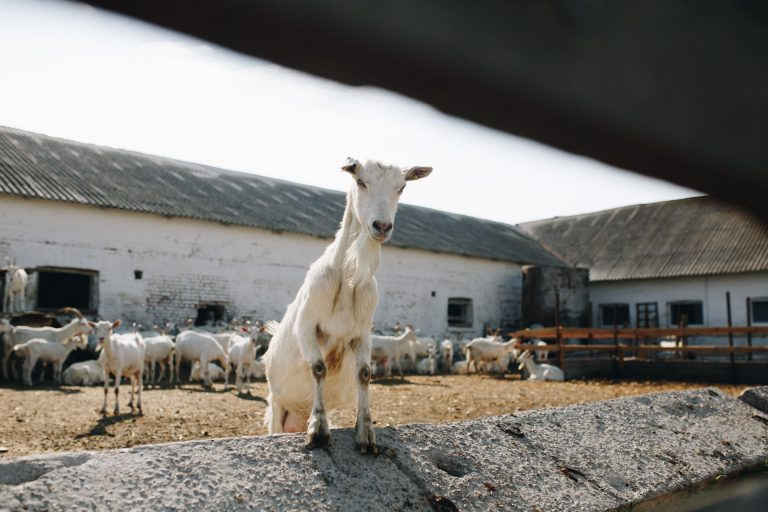
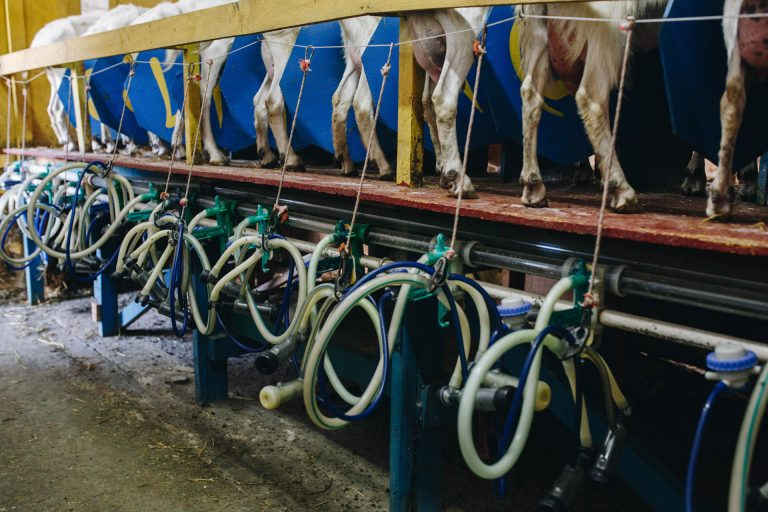
slideshow
Today, all the goats are milked automatically by a special milking machine. The milk is of high quality, because it is obtained without the contact of human hands, as Oleksandr explains.
“In a single milking session, one Saanen goat gives from one and a half to three litres of milk. It depends on how she lactates, how she was fed, the time of year, and so on. It depends on a lot of factors. Older goats have more udders; this one here is a young goat. You can tell by the fact that the udder is clean, without pigment spots, but it is still growing and it has not reached its maximum size. Each goat is milked for about two minutes. We can see that the udder is almost empty. We’ve almost finished milking one teat, but the milk is still coming. There, that’s this goat milked, and now we connect up the next one. And then the next in line. While she is being milked, we remove the device from the rest of the goats.”

Cheese and Soap
There is a specially designated place where the various types of cheese are stored: for example, those that mature for a long time, hard and semi-hard cheeses. The oldest is thirteen months old. For the soft cheeses — which are mostly mould-ripened — there is a separate storage room. Alexander reveals the special features of each cheese:
“This cheese, for example, is about two months old. It has blue mould where it has come into contact with wood. Then we have more cheeses with blue mould that only develops internally — that is, if we cut it, we’ll see it. Some cheeses ripen in their natural rind. These cheeses are over a year old now. They are already similar in consistency to Parmesan, they’re dry. These cheeses are more of an industrial option, covered with a latex coating, because lots of people are scared of cheeses, made according to traditional methods. If the cheese sticks to your hands, if it stinks, they immediately suspect that it’s gone bad. Nobody knows it’s supposed to be like that.”

In addition to cheese making, the Babin family also produced 12 types of soap from goat butter. All the components that go into its production are natural. For example, ground coffee is added to coffee soap, then, bergamot essential oil and black tea leaves are added to bergamot soap, and so on. Anna, who makes the soap, learned this business on her own through constant experimenting. It is usually made in winter, and all the necessary ingredients are harvested in autumn. About one hundred bars of soap are made at a time:
”For example, our ginger soap is natural, made from goat butter and milk. It is cold-processed, and just like with cheese, it needs time to ripen. This soap matures in about a month, also on wooden boards. We also have soap with bergamot, vanilla, grapefruit, and we have cinnamon. All these ingredients add additional properties to the soap, but the main ingredient — goat butter, that is — all at once has an alkaline effect, cleansing and moisturising the skin in parallel. It is absorbed into the epidermis and retains moisture for up to 12 hours.”

Like all the founders of family-run goat farms, the Babin family put a lot of effort and love into their work. These days, tourists often come to the farm, mostly in summer. Usually they receive the most visitors during weekends or holidays.
Oleksandr reveals the secret of their popularity:
“You don’t have to go somewhere in Switzerland, to the Alps, to try Swiss cheese. You can come to the Tetiiv region, and you’ll find the same hilly terrain and the same delicious cheese here. You don’t need to go far, everything is close at hand.”


